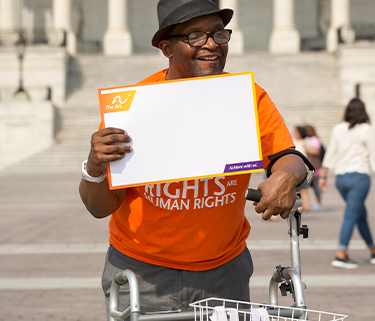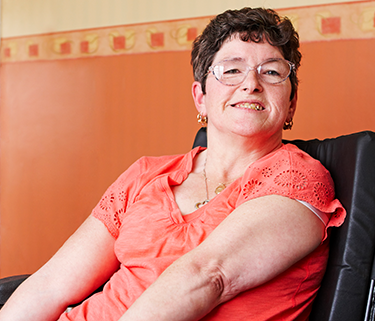Resolution of Federal Complaint Amidst Nationwide COVID-19 Surge Raises Bar in Prohibiting Blanket DNRs, Medical Discrimination Against People With Disabilities
WASHINGTON, D.C. – Today, amidst rampant spread of COVID-19 infection throughout the country, the U.S. Department of Health & Human Services Office for Civil Rights (OCR) announced the resolution of a federal complaint filed against Utah. The complaint, brought by the Utah Disability Law Center and a coalition of national groups—The Arc of the United States, Center for Public Representation, Bazelon Center for Mental Health Law, Autistic Self Advocacy Network, Disability Rights Education and Defense Fund and Samuel Bagenstos—is one of nearly a dozen complaints that the groups have been brought nationwide challenging states’ plans for rationing medical care during the COVID-19 pandemic as discriminating against people with disabilities. Today’s resolution sets a national precedent, with OCR building off earlier resolutions of complaints regarding plans in Alabama, Pennsylvania, and Tennessee and weighing in on the discriminatory impact of a number of provisions common in many states’ rationing plans.
The complaint against Utah alleged that the state’s plan illegally excluded certain people with disabilities from accessing life-saving treatment like ventilators based on their disabilities and deprioritized others based on their disabilities. In response to the complaint and engagement with OCR, Utah has revised its Crisis Standard of Care Guidelines to comply with federal disability rights laws and ensure that people with disabilities are not discriminated against even when public health emergencies, such as the COVID-19 pandemic, necessitate the rationing of scarce medical resources.
Most notably, hospitals must now provide information on the full scope of available treatment alternatives, including the continued provision of life-sustaining treatment, and may not impose blanket Do Not Resuscitate (DNR) policies for reasons of resource constraint. Physicians may not require patients to consent to a particular advanced care planning decision in order to continue to receive services from the hospital. This is the first time OCR has weighed in on this issue.
The following are additional key changes in Utah’s policy to avoid discrimination against people with disabilities:
- No Exclusions or Deprioritizing Based on Resource Intensity or Disability Diagnosis: An individual can no longer be excluded from, or deprioritized for, medical treatment based on the fact that they might require more time or resources to recover or because they have a disability diagnosis or functional impairment. Rather than making assumptions about a patient’s ability to respond to treatment based solely on stereotypes, medical personnel must perform an individualized assessment of each patient based on the best objective current medical evidence
- No Long-Term Survivability Considerations: Utah has eliminated long term survivability as a consideration in treatment decisions, changing its Guidelines to allow medical personnel to consider only “short-term mortality.” Survivability is a factor that can be fraught with speculation, mistaken stereotypes, and assumptions about the quality of life and lifespan of people with disabilities.
- Reasonable Modifications Required: Utah’s Guidelines now require hospitals to make reasonable modifications to the Modified Sequential Organ Failure Assessment (MSOFA)—the tool used to prioritize access to medical treatment—to avoid penalizing people with underlying conditions that are unrelated to their ability to benefit from treatment. The Guidelines note that other reasonable modifications may also be required to provide equal access to treatment for patients with disabilities.
- Reallocation of Personal Ventilators Prohibited: Medical personnel may not reallocate the personal ventilator of a patient who uses a ventilator in their daily life to another patient whom the personnel deem more likely to benefit from the ventilator in receiving treatment.
“COVID-19 cases are rising nationwide and the threat of care rationing is real. This resolution makes major progress toward ensuring that people with disabilities have equal access to the care and tools necessary to fight COVID-19 infection,” said Peter Berns, Chief Executive Officer, The Arc. “We are grateful to OCR for continuing to recognize the rights of people with disabilities during this pandemic and we will keep fighting for revisions to discriminatory policies that could mean the difference between life and death for people with disabilities.”
“We are very pleased that our state has worked with OCR to end this immoral and illegal practice of rationing care for people with disabilities,” said Laura Henrie, Associate Legal Director of the Utah Disability Law Center. “Utah has seen cases surge over the last several weeks, which puts pressure on our healthcare system. The fear of not getting life-saving treatment was very real for people like our client, Jacob. We are thankful for OCR’s efforts in protecting the rights of people with disabilities, so that folks like Jacob have equal access to care.”
“Today’s resolution sends a clear message during a dire time: people with disabilities must have equal access to life-saving treatment during the COVID-19 pandemic,” says Alison Barkoff, Director of Advocacy at the Center for Public Representation. “Many states’ medical rationing plans have discriminatory provisions similar to those in Utah. We urge states across the country to heed this warning and revise their plans now to comply with federal disability laws.”
In addition to filing complaints with OCR, the national disability organizations have created resources at the Center for Public Representation and The Arc to assist stakeholders across the country in evaluating and advocating for non-discriminatory medical rationing plans.
For more information about today’s resolution, contact:
Nate Crippes, Utah Disability Law Center
ncrippes@disabilitylawcenter.org or 801-910-5815
Alison Barkoff, Center for Public Representation
abarkoff@cpr-us.org or 202-854-1270
Kristin Wright, The Arc of the United States
wright@thearc.org or 202-617-3271











